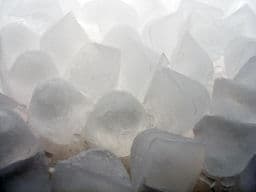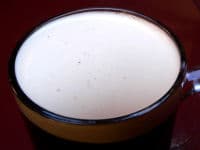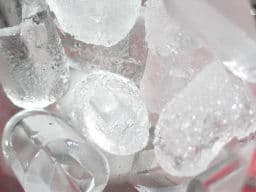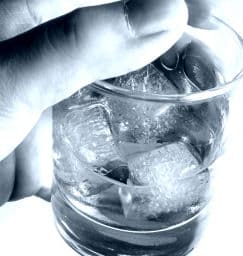Ice, The Forgotten Ingredient
Why you need to pay attention to those cubes
4/2/2007 12:00 AM
Ice gets lost in drink preparation. Usually there is a lot more focus on the liquor, the mixers, the technique of preparation, or even the garnish. Ice is merely there to do its job, and then sometimes, to be strained out.
Ask someone what ice's primary job is in a drink and they will often say, "To chill the drink". Chilling is important, but equally important is ice's role in diluting a drink to bring it into balance. Melting ice provides water to a drink. The water dilutes strong alcohol, tempers sour lemon juice, tames cane syrup, and evens out bitters. The flavor extremes of the drink's ingredients are balanced, and in some cases opened up, much like a bit of water opens up a cask strength Scotch.
So that's two very important benefits from ice: chilling the drink, and dilution. There is a third benefit that ice can impart to a drink. Combined with shaking, ice will aerate a drink, incorporating air into the liquid as the drink is churned inside the shaker. A tell-tale sign of aeration is froth or a head on top of the drink.
Different drink recipes require different amounts of chilling and different amounts of dilution. You want to use the right type and amount of ice to do the job. And you want to make sure your liquors and mixers are at the proper temperature when they come in contact with the ice.

over ice.
Don't freeze your vodka
In an effort to produce the coldest Martini possible, I have seen some people put their vodka or gin in the freezer before making the drink. This produces two undesirable side effects. First, because the liquor is the same temperature as the ice, very little ice will melt in the shaker. Because of this, the Martini will be far too strong. It is akin to just pouring the frozen liquor in a glass.
The second side effect is that if you're shaking the drink, the contents of the shaker will turn into an icy mess. The vermouth will freeze, cause ice cubes to stick together, and clog the strainer. Your vermouth remains in the shaker, and all you get is viscous, frozen vodka or gin. So there is good reason to start with room temperature liquor in a Martini. You want the ice to chill the liquor, and in turn, melt somewhat to dilute the drink slightly.

Due to their size and shape, they melt
a bit quicker than the ice from your
refrigerator.
Use clean water in your ice
If you indulge yourself with fine 12 year old aged rum to make a Mai Tai, shouldn't you also use the same care with your ice? Especially in a rocks drink? If possible, use filtered water to make your ice. Modern refrigerators have filters built in for making the ice and for the water dispenser.
Don't store ice for too long. It will start to pick up odors from the other food in the freezer. If you have a dedicated ice maker, you don't need to worry about this.
Match the type of ice to the amount of dilution required
For Martinis and Manhattans, ice cubes are fine. You want only a measured amount of dilution, and ice cubes will melt slowly in the shaker.

a rocks drink.
You want to use crushed ice in frozen drinks. This helps the blender to fully incorporate the ice into the drink so as not to leave chunks floating around. Crushed ice also works for shaken drinks when you want more dilution. I use crushed ice to shake Caipirinhas--more dilution is necessary to tame the Cachaca, lime juice, and sugar. You will also want to use crushed ice to chill a glass. With more surface area, crushed ice will melt faster and thereby chill the glass faster.
If you're making a punch bowl for a party, you need it to stay cold for hours, but you don't want it to get watery. A block of ice works here. It will melt very slowly, but still impart enough of a chill to keep the punch cold (or cool in warmer climes). You can make your own blocks of ice in plastic bottles. Just cut away the plastic bottle before you use it.
Ice is just as important as the other ingredients in a drink. Use the same care with your ice as you do with your liquors and mixers to achieve delicious results in your bar.
Last updated 5/19/2007 2:01 PM